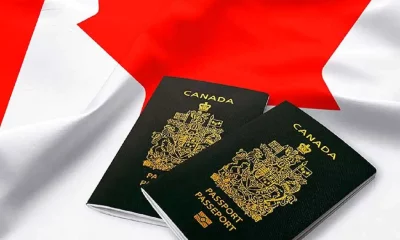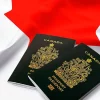Career
9 Ways to Travel to Canada As an Immigrant
If you’re finding the process of migrating to Canada burdensome, don’t worry. You simply need the right information. Canada warmly welcomes students, entrepreneurs, skilled and unskilled workers, and families seeking new opportunities. Allow me to provide you with a straightforward solution. A simple and legal ways to make your move to Canada a reality. Let’s skip the overwhelming statistics and get straight to the point. Here are practical strategies to help you navigate the immigration process and start a new chapter in this diverse and prosperous country.
Immigrating to Canada is a dream for many, thanks to its high quality of life, excellent healthcare, and welcoming multicultural society. The process may seem daunting, but there are several straightforward pathways to help you achieve your goal. Here are some simple strategies to consider:
9. Express Entry
The Express Entry system is one of the most efficient and popular ways to immigrate to Canada, especially for skilled workers. Launched in 2015, it manages applications for three federal economic immigration programs: the Federal Skilled Worker Program, the Federal Skilled Trades Program, and the Canadian Experience Class. Here’s a detailed look at how the Express Entry system works and how you can maximize your chances of success.
Express Entry is a points-based system designed to select candidates who are most likely to succeed economically in Canada. It consists of three immigration programs: Canadian Experience Class, Federal Skilled Worker Program, and Federal Skilled Trades Program. The system uses the Comprehensive Ranking System (CRS) to score candidates based on several factors, including:
– Age
– Education
– Work experience
– Language proficiency in English and/or French
– Canadian work experience (if any)
– Additional factors like a provincial nomination or a valid job offer
Eligibility Requirements
To be eligible to enter the Express Entry pool, you must meet the minimum requirements of one of the three federal immigration programs:
Federal Skilled Worker Program (FSWP): Requirements:
– At least one year of continuous full-time or equivalent paid work experience in a skilled occupation within the last ten years.
– Minimum language proficiency in English or French (CLB 7 or higher).
– Educational credentials equivalent to a Canadian high school diploma or higher.
– Sufficient funds to support yourself and your family unless you have a valid job offer.
Federal Skilled Trades Program (FSTP) Requirements:
– At least two years of full-time work experience in a skilled trade within the last five years.
– Minimum language proficiency (CLB 5 for speaking and listening, CLB 4 for reading and writing).
– A valid job offer for full-time employment for at least one year or a certificate of qualification in your skilled trade issued by a Canadian provincial, territorial, or federal authority.
Canadian Experience Class (CEC) Requirements:
– At least one year of skilled work experience in Canada within the last three years.
– Minimum language proficiency (CLB 7 for NOC 0 or A jobs, CLB 5 for NOC B jobs).
Creating an Express Entry Profile
To begin the process, you need to create an Express Entry profile online. This profile includes details about your age, education, work experience, language skills, and other personal information. Based on the information provided, you will be assigned a CRS score.
Steps to create a profile:
– Gather Documents: Before creating your profile, gather necessary documents such as your passport, language test results, educational credential assessment (ECA) report, and a job offer if applicable.
– Submit Profile: Complete and submit your online Express Entry profile. If you meet the eligibility criteria, you will be entered into the Express Entry pool of candidates.
Improving Your CRS Score
Your CRS score is crucial in determining your chances of receiving an Invitation to Apply (ITA) for permanent residence. Here are some ways to improve your score:
Enhance Language Skills: Retake language tests to achieve higher scores.
Gain More Work Experience: Obtain additional work experience in your field.
Advance Your Education: Complete additional educational programs or degrees.
Secure a Job Offer: Obtain a valid job offer from a Canadian employer.
Provincial Nomination: Apply for a provincial nomination through a Provincial Nominee Program (PNP), which can add 600 points to your CRS score.
Receiving an Invitation to Apply (ITA)
The Canadian government conducts regular draws from the Express Entry pool, issuing ITAs to the highest-ranking candidates. If you receive an ITA, you will have 60 days to submit a complete application for permanent residence. All details and forms will be inside your mail.
After submitting your application, IRCC will process it, typically within six months. If approved, you will receive a Confirmation of Permanent Residence (COPR) and a permanent resident visa, if applicable. You can then make plans to move to Canada and start your new life.
8. Family Sponsor
The Family Sponsorship Program allows Canadian citizens and permanent residents to bring their relatives to Canada, facilitating opportunities for education, business, and visits. This program operates in two capacities: if you are looking to migrate to Canada, you are the applicant; if you are already in Canada, you are the sponsor, responsible for the expenses of your relative.
Eligibility Criteria
To be eligible to sponsor a family member, you must:
– Be a Canadian citizen, a permanent resident of Canada, or a registered Indian under the Canadian Indian Act.
– Be at least 18 years old.
– Prove that you are not receiving social assistance, except for disability-related reasons.
– Repay any previous debts if you have sponsored a spouse, partner, or child who received financial support from the government.
– Not have been convicted of certain offenses, such as violent crimes or offenses against family members.
Requirements
To successfully sponsor a family member, follow these steps:
Download and Complete Forms: Obtain the application package from the official IRCC website and fill out the required PDF forms.
Sign the Forms: Both the sponsor and the principal applicant (the person being sponsored) must digitally sign the forms.
Submit the Application: The principal applicant must upload the completed forms to their online application and electronically sign the entire application.
Follow Application Guide: Ensure all forms are filled out accurately, following the instructions provided in the application guide.
Pay the Fees: Pay the required application fees, including processing fees, the right of permanent residence fee, and the biometrics fee.
Provide Additional Information: Be prepared to provide additional documents during the application process, such as medical exams, police certificates, and biometrics.
By meeting these criteria and fulfilling the necessary requirements, you can successfully sponsor your family member to join you in Canada, helping them take advantage of the numerous opportunities the country offers.
7. Provincial Nominee Programs
Click here for Full details on Moving to Canada through Provincial Nominees
6. Quebec Selected Skilled Workers
If you wish to migrate to Canada(Québec) permanently for work, Quebec-selected Skilled workers suit you.
==> How to Migrate to Canada As A Quebec-Selected Skilled Worker
5. Atlantic Immigration Program
Enrolling in this program is an option if you’re a graduate from any of the Atlantic regions of Canada, including New Brunswick, Prince Edward Island, Nova Scotia, Newfoundland, and Labrador.
Eligibility Criteria
Work Experience: You need to have eligible work experience, unless you’re an international graduate of a recognized post-secondary institution in Atlantic Canada. In the last 5 years, you should have worked at least 1,560 hours, equivalent to working 30 hours per week for 1 year. Count only paid hours of work, excluding volunteering or unpaid internships. Your work experience should fall under specific National Occupational Classification (NOC) 2021 categories.
Educational Requirements:
– For job offers in NOC 2021 TEER 0 or 1 category, you need a Canadian one-year post-secondary educational credential or higher, or its equivalent.
– For job offers in NOC 2021 TEER 2, 3, or 4 categories, you need a Canadian high school diploma or its equivalent.
– If you studied outside Canada, you require an Educational Credential Assessment (ECA) to confirm the equivalency of your education.
Language Requirements: You must meet the minimum language requirements based on the NOC 2021 TEER category of your job offer. Language proficiency can be assessed through Canadian Language Benchmarks (CLB) or Niveaux de compétence linguistique canadiens (NCLC). You need to meet CLB/NCLC 5 for TEER 0, 1, 2, or 3, and CLB/NCLC 4 for TEER 4. Submit language test results from a designated language testing organization, which should be less than 2 years old at the time of application.
Settlement Funds: You must have sufficient funds to support yourself and your family upon arrival in Canada. The required amount depends on the size of your family, including anyone you support who is not immigrating with you. If you’re already living and working in Canada with a valid work permit, you’re exempt from showing proof of funds.
Requirements
Have qualifying work experience, meet educational and language requirements, and show sufficient settlement funds (unless exempt).
– Obtain a job offer from a designated Atlantic employer.
– Gather necessary documents and prepare them for submission.
– Apply for permanent residence through the Atlantic Immigration Program.
– Optional: You can also apply for a temporary work permit if desired.
– After submitting your application, follow the instructions provided and wait for a decision.
– If your application is approved, you will receive confirmation and further instructions.
4. Startup Visa
The Start-up Visa Program is a unique immigration initiative in Canada designed to attract talented entrepreneurs who want to establish innovative businesses in the country.
Eligibility Criteria
To qualify for the Start-up Visa Program, applicants must meet the following criteria:
1. Have a Qualifying Business:
Applicants must hold at least 10% of the voting rights in the corporation when receiving a commitment from a designated organization.
Together, the designated organization and the applicant must jointly hold over 50% of the total voting rights at the time of receiving the commitment.
2. Letter of Support from a Designated Organization:
The designated organization should be an approved business group that invests in or supports startups.
They must believe in the value of the applicant’s business idea before providing a letter of support.
3. Meet the Language Requirements:
Applicants must demonstrate proficiency in English or French by taking a language test from an approved agency.
The minimum language skills required are Canadian Language Benchmark (CLB) 5 in speaking, reading, listening, and writing.
4. Settlement Funds:
Applicants must provide proof that they have sufficient funds to support themselves and their dependents upon arrival in Canada.
The required amount of funds depends on the size of the applicant’s family.
Additional Information
It’s important to note that the Government of Canada does not provide financial support to start-up visa immigrants, and applicants cannot borrow the required settlement funds from another person.
Application Process
If an applicant meets all the eligibility criteria and requirements, they can apply for the Start-up Visa Program. If approved, they will be granted permanent residence in Canada, enabling them to bring their innovative business ideas to life in a welcoming and supportive environment.
3. Work Permits
Work permits and temporary visas provide opportunities for foreign nationals to work, study, or visit Canada temporarily. Understanding the eligibility criteria and application process is crucial for a successful application. Whether you’re seeking employment, pursuing educational opportunities, or planning a visit to Canada, ensure you meet the requirements and submit a complete and accurate application to maximize your chances of approval.
What is A Work Permit?
A work permit is a document issued by Immigration, Refugees and Citizenship Canada (IRCC) that allows foreign nationals to work legally in Canada for a specified period. Here’s what you need to know about work permits:
Types of Work Permits
- Open Work Permits: Allow you to work for any employer in Canada, except for employers who are not eligible to hire foreign workers.
- Employer-Specific Work Permits: Tie you to a specific employer and job in Canada. You can only work for the employer named on your work permit.
Eligibility for Work Permits
– Job Offer: You typically need a job offer from a Canadian employer to apply for a work permit.
– Labour Market Impact Assessment (LMIA): In most cases, your employer needs to obtain an LMIA to demonstrate that there is a need for a foreign worker to fill the job and that no Canadian worker is available.
– International Mobility Program (IMP): Some work permits do not require an LMIA under certain circumstances, such as through international agreements (e.g., NAFTA), reciprocal employment (e.g., intra-company transfers), or significant economic, social, or cultural benefits to Canada.
Canada Work Permit Application Process
Submit Application: You or your employer must submit the work permit application to IRCC, either online or through a Visa Application Centre (VAC).
Biometrics: Depending on your nationality, you may need to provide biometrics (fingerprints and photo) at a biometric collection point.
Processing Time: Processing times vary depending on the type of work permit and the location of the application. In some cases, you may be eligible for expedited processing.
Duration of Work Permits
– Work permits are usually issued for a specific period, often corresponding to the duration of your job contract or project.
– Extensions may be possible in certain cases, but you may need to apply for a new work permit if your situation changes, such as switching employers.
2. Temporary Visas or Visit Visa
Temporary visas allow foreign nationals to visit Canada for tourism, business, study, or other temporary purposes.
Types of Temporary Visas
– Visitor Visas (Temporary Resident Visas): Required for citizens of many countries to enter Canada for tourism, visiting family or friends, or conducting business.
– Study Permits: Allow foreign nationals to study at designated learning institutions (DLIs) in Canada.
– Temporary Resident Permits (TRPs): Issued to individuals who are otherwise inadmissible to Canada but have compelling reasons to enter temporarily, such as for humanitarian reasons or for urgent business or personal matters.
Eligibility for Temporary Visas
– Purpose of Visit: You must demonstrate that your visit to Canada is temporary and that you intend to return to your home country at the end of your authorized stay.
– Financial Means: You may need to provide evidence of sufficient funds to support yourself during your stay in Canada, as well as ties to your home country (such as employment, family, or property) to demonstrate your intention to return.
Temporary Visa Application Process
– Submit Application: Apply for a temporary visa online or through a Visa Application Centre (VAC) in your home country.
– Biometrics: Depending on your nationality, you may need to provide biometrics (fingerprints and photo) at a biometric collection point.
– Processing Time: Processing times vary depending on the type of visa and the location of the application. It’s advisable to apply well in advance of your planned travel date.
Duration of Temporary Visas
– Temporary visas are typically issued for a specific period, depending on the purpose of your visit (e.g., tourist visas may be valid for up to six months).
– Extensions may be possible in certain cases, but you must apply before your current visa expires and meet the eligibility criteria for extension.
1. Study Permit
One of the best and easiest ways to migrate to Canada is as a student. A student permit, also known as a study visa, is a document issued by Immigration, Refugees and Citizenship Canada (IRCC) that allows foreign nationals to study at designated learning institutions (DLIs) in Canada. Here’s what you need to know about student permits:
Eligibility for Student Permits
– Letter of Acceptance: You must have a valid letter of acceptance from a DLI in Canada before applying for a student permit. So to be eligible for a study permit, students must be enrolled in a program at a recognized Designated Learning Institution (DLI) in Canada.
– Financial Means: You need to demonstrate that you have sufficient funds to cover tuition fees, living expenses, and return transportation to your home country.
– Ties to Your Home Country: You must demonstrate ties to your home country, such as family, property, or employment, to show that you intend to return after completing your studies.
– Character and Health Requirements: Students must adhere to the law, have no criminal record, and, depending on the case, may need to undergo a medical examination to prove their good health.
Additional Info
For students who are legal residents of certain countries, the Student Direct Stream offers faster processing of study permit applications when applying online.
Study permit conditions may include permission to work, travel restrictions, specific departure dates, or limitations on the designated learning institution (DLI). It is crucial to follow these conditions.
Student Visa Application Process
Submit Application: Apply for a student permit online or through a Visa Application Centre (VAC) in your home country.
Biometrics: Depending on your nationality, you may need to provide biometrics (fingerprints and photo) at a biometric collection point.
Medical Examination: In some cases, you may need to undergo a medical examination to ensure you meet health requirements for entry into Canada.
Processing Time: Processing times vary depending on the location of the application and other factors. It’s advisable to apply well in advance of your intended start date for studies.
Duration of Student Permits
– Student permits are typically issued for the duration of your study program, plus an additional 90 days.
– Extensions may be possible if you need more time to complete your studies or if you wish to pursue further education in Canada.
Working While Studying
On-Campus Work: Student permit holders are generally allowed to work on campus without a separate work permit.
Off-Campus Work: You may be eligible to work off campus for up to 20 hours per week during the academic session and full-time during scheduled breaks, provided you meet certain eligibility criteria.
Post-Graduation Work Permit (PGWP)
After completing your studies in Canada, you may be eligible to apply for a post-graduation work permit (PGWP), which allows you to work in Canada for up to three years.
To be eligible for a PGWP, you must have completed a full-time program of study at a DLI lasting at least eight months and have received a degree, diploma, or certificate.
More Topics for You:
- How to Plan a Budget-Friendly Immigration to Canada
- Easiest Way to Get Permanent Residency in Canada
- Types of Canada Visa You Can Get to Travel
- Secure Sponsorship for Your Journey to Canada – Read Now
- Unlock Your Dream to Work and Live in Canada as a Caregiver
Conclusion
Canada offers a diverse range of immigration pathways, including the Express Entry system, Provincial Nominee Programs (PNPs), Family Sponsorship, Start-up Visa Programs, Work Permits, Temporary Visas, and Student Permits. These pathways cater to individuals with different skills, qualifications, and aspirations, providing opportunities for students, entrepreneurs, skilled workers, families, and temporary visitors to make Canada their home.
By understanding the eligibility criteria, application processes, and associated benefits of each pathway, individuals can navigate the immigration process effectively and embark on a new chapter in Canada, a country known for its inclusivity, diversity, and opportunities for personal and professional growth. Whether seeking permanent residence, temporary work or study opportunities, or visiting for leisure or business, Canada welcomes individuals from around the world to contribute to its vibrant and thriving communities.















